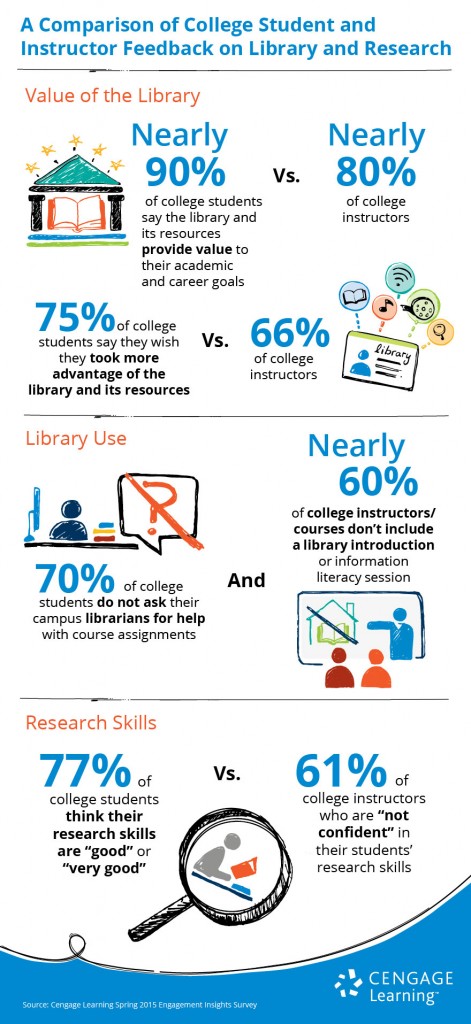By Jennifer Albers-Smith
When it comes to student and instructor perceptions about academic libraries and research, some interesting insights are revealed – as well as lot of questions.
In spring 2015, Gale’s parent company, Cengage Learning, issued its Engagement Insights survey to some 3,000 students and nearly 700 professors, gathering feedback on different topics including how both audiences valued the library, how they often they took advantage of its resources and more.
Overall, the survey revealed students seem to value the library more than instructors – 90% of students say the library and its resources provide value to their academic and career goals versus only 80% of instructors. Students clearly see the value of the library but still 70% of students do not ask their campus librarians for help with course assignments. Why the disconnect? It’s a question that Gale and many of our customers are trying to answer and trying to change. What can we do to make students more comfortable in the library? How can we make the library a necessary and integral part of students’ and instructors’ daily workflow?
Disparities also exist among research skills as well. While students perceive their research skills to be good, instructors do not. Roughly three-quarters of students rated their research skills as good or very good, while more than half of professors say they are not confident in their students’ research ability.
These stats and more can be found in the infographic here. We encourage you to share these survey results, as well as provide your thoughts on the findings and ideas on how the academic library can be further engrained in student and instructor workflow in the comments section below.
[alert-info]
 About the Author
About the Author
Jennifer loves her children, dogs, and Jane Austen. She has a B.A. in English and Sociology from the University of Michigan, and spends her waking hours as a marketing director and feeding her family.
[/alert-info]




How can the survey results be accessed. Your last paragraph says “These stats and more can be found in the infographic online here.” Where here? There is no link and selecting the graphic only changes how it is displayed. I’d like to study the data results.
Hi Robert,
Sorry for the confusion, we have removed “online” for greater clarity. The results from the survey are in the infographic displayed here. You should be able to right click on it and save the image for further investigation.
Thanks,
Robert
“Why the disconnect?”
Sorry, I don’t see a disconnect. The survey results show that 90% of students value the library while only 30% ask the librarian for help with course assignments. Most librarians I’ve met were English or History majors and definitely have more to offer in those areas.
My experience was that University librarians could add value for General Education courses, but were not able to help when the assignments became much tougher. Many of the librarians were students and didn’t have much helpful library knowledge. Even the long-term librarians weren’t much help for a Chemical Engineering major.
At that point, forming study groups for the higher level classes was much more efficacious and better held in the engineering building where we might occasionally get help from higher level students. There was no time or thought given to going to the library after the G.E. courses were completed.
Mr. Jensen: Full disclosure — I’m an academic librarian. I value your input and understand what you’re saying. As “expert trainers” or “assignment helpers” for students in advanced studies of technical fields, librarians will more times than not be ineffective. (The exceptions are cases like where the librarian also has a JD or MD or other specialty degree for the students they are helping, which does happen.) But is “expert trainer” our primary role? I think the marketing of librarians as “assignment helpers” (like it was done in this infographic) is a tricky one.
Faculty are obviously the number one resource for students looking for specific help with their course assignments, and graduate assistants/TAs are a close second. I believe that librarians are a resource for faculty, TAs, and students to use when dissecting the nature of information: what information are you looking at, what context is it in, what else is out there, how was this information created, why is this information preferred over other types, how do we assess information, how do we access information. (But, yes: we can also locate articles and books and obtain them if we don’t own them.) I do understand that all of that information stuff might be a bit philosophical for someone trying to balance a chemical equation, and that’s fine — you don’t always have to engage with those topics.
But if we view student education holistically — as a way not only to provide students with the necessary knowledge and skills to obtain a job and be successful in their work, but also as a way to develop their appreciation of knowledge and their thirst for it and their ability to engage in lifelong learning, that’s where I see librarians fitting into the mix. Do some students already have those qualities? Sure. I’ll admit that I was fully invested in my undergraduate and graduate education, but I never once made it a point to see my own subject librarian during my studies (though I did use the generic “ask a librarian” email and chat services on occasions, and I did go into the library a fair amount). But I don’t see that situation as a problem. Librarian assistance (especially with things like information literacy, which is what I was describing in my above list of questions about information), like college itself, is not for 100% of people. But for those who want to explore the nature of information and how it’s created and valued and organized and connected (and, yes: for those who need three, just three, any three articles about Italian Renaissance paintings), I think librarians are a great resource.
Students clearly see the value of the library but still 70% of students do not ask their campus librarians for help with course assignments.
I agree to the above point.